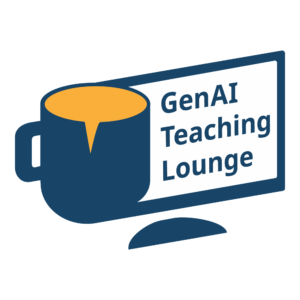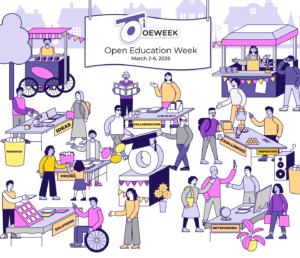
BCcampus Sponsored Events
BC Open Education Librarians: Science Education for a Just and Sustainable World
March 2, 2026 | 12:00–1:00 p.m. March 2–6, 2026, marks Open Education Week and UN Sustainable Development Goals Action and Awareness Week. Join BCcampus, the BC Open Education Librarians, University Canada West, and Langara College for a celebration of both of these occasions with keynote speaker Dr. Karen Cangialosi and her virtual talk titled, “Science Education for a Just and Sustainable World.”Simon Fraser University: Student Perspectives on Open Educational Resources (OER) – Survey Results & Reflections
March 3, 2026 | 11:30 a.m.–12:30 p.m. In celebration of Open Education Week, join the Open Education Community of Practice for a hybrid conversation highlighting students’ perspectives on using OER at SFU. This session will share key findings from two recent student surveys. The first, conducted by the Library and Learning Experiences Assessment & Planning (LEAP), examined students’ experiences using open textbooks and other OER in the classroom. The second was a student satisfaction survey exploring student affordability, course material costs and OER alternatives. These presentations will be followed by a discussion exploring community needs, questions, and opportunities to strengthen support for OER and open education at SFU.Vancouver Island University Students’ Union: Open Education Book Fair
March 3, 2026 | 11:30 a.m.–1:30 p.m. The Open Education Book Fair at VIU in Nanaimo invites you to browse openly licensed textbooks and course materials, learn how OERs make learning more affordable and accessible, and explore VIU’s Zero Textbook Cost Pilot Program. Chat with folks from VIUSU, BCcampus, VIU Librarians, and VIU’s Centre for Innovation and Exellence in Learning (CIEL) staff to discover tools and resources you can use right away, and enjoy free snacks as you browse. All materials are free, available from day one, and require no access codes or extra costs.Vancouver Community College: OER from Creation to Classroom
March 3, 2026 | 12:00–1:00 p.m. The VCC Open Education Working Group invites you to OER from Creation to Classroom, a hybrid panel discussion designed to demystify adopting, adapting, and creating OER. You’ll hear firsthand experiences from panelists Julie Crouse (Nova Scotia Community College), and Shantel Ivits and Venecia Williams (Vancouver Community College). Whether you’re new to OER or well-versed, this session will include lessons learned from instructors who’ve successfully created and/or adopted OER into their classrooms and an opportunity to ask questions.Thompson Rivers University: Opening Knowledge: Open Education at TRU — Impact, Innovation, and Community
March 3, 2026 | 12:00–1:30 p.m. Join TRU Open Press and the Open Education Working Group (OEWG) for a special Open Education Week 2026 panel and showcase celebrating the impact of open education at Thompson Rivers University. This interactive hybrid event will feature:- A panel discussion with faculty, staff, and student contributors engaged in OER and Open Educational Practices (OEP)
- A showcase of selected TRU Open Press projects
- Audience Q&A and live engagement opportunities
College of the Rockies: Flourishing Futures – Open Education for People, Place, and Planet
March 12, 2026 | 10:00 a.m.–12:00 p.m. (11:00 a.m.–2:00 p.m. MT) Flourishing Futures celebrates the link between ‘open’ and ‘sustainable development’ as a practical strategy for connecting people, place, and planet. Virtual attendees are invited to tour digitally interactive Spotlight Stations that shine a light on the creative and innovative ways Open Education and Sustainable Developmental Goals (SDGs) can be combined to benefit students, instructors, and communities.Douglas College: Open Education: Knowledge Sharing – Learn, Create, Collaborate
March 13, 2026 | 10:00 a.m.–3:00 p.m. The Douglas College Library is excited to host a hands-on opportunity to learn, create, and collaborate. Faculty from all departments are invited to discover how OER of any size can enrich teaching and boost student engagement in the classroom. Jump into the world of open education with Alicia Arding (Learning Resources Faculty) and the Library’s enthusiastic OER Team as they guide you in creating your very own OER resource—no experience needed.About the Session
This session explores how generative AI can support more inclusive teaching through the lens of Universal Design for Learning (UDL). Through live demonstrations, practical activities, and collaborative discussion, you’ll experiment with AI tools to redesign lessons, activities, or resources that reflect UDL principles.
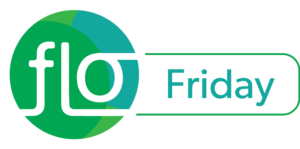
This workshop is not an introduction to GenAI or UDL, but an opportunity to explore how generative AI can help you design flexible, accessible, and learner-centered learning experiences. You’ll leave with a draft product tailored to your own context, and new strategies for using AI to reduce barriers and support diverse learners.
Register Now!
This session may be recorded, archived, and shared after the event.
About the Facilitator
Kelly Fyke is a Teaching and Learning Specialist at College of the Rockies with 20 years’ experience spanning K–12 teaching, international education, and post-secondary educational development. Her work focuses on generative AI in education, Universal Design for Learning, and inclusive teaching. Kelly is passionate about empowering educators, creating equitable learning spaces, and supporting innovation that helps students thrive. Connect with Kelly on LinkedIn.
BCcampus is a proud member of the Sunflower Hidden Disabilities initiative. If you have a hidden disability that might affect your participation, you can download a virtual sunflower background to indicate that you may need a helping hand, understanding, or more time. If you require any support or have any questions, email sunflower@bccampus.ca
We’re excited to introduce the GenAI Teaching Lounge: an informal, virtual space where educators can gather over a hot drink to explore teaching ideas with Generative Artificial Intelligence (AI).
Curious about using AI tools to support assessment design? Wondering how to centralize student voices when integrating AI into coursework? Or simply want to share your own stories and tea with others? The Lounge is your space to ask questions, exchange ideas, and learn with colleagues.
No lectures, no recordings—just conversation, connection, and curiosity. Join us for a 45-minute drop-in session designed to generate practical takeaways and strengthen our teaching community.
Sessions
Sessions will be held from 2:00–2:45 p.m. PT:
- October 21, 2025
- November 25, 2025
- January 13, 2026
- February 17, 2026
- March 10, 2026
Register Now!
This session will not be recorded.
Hosts
Gwen Nguyen (she/her) is a Learning + Teaching Advisor at BCcampus supporting the adaptation and evolution of teaching and learning practices in post-secondary education through collaboration, innovation, and digital technologies. Gwen worked as a learning experience designer at the University of Victoria (UVic), supporting educators with developing and delivering face-to-face, hybrid and online courses. She has also worked as a university lecturer and researcher at UVic and the Kanazawa Institute of Technology in Japan. Gwen holds a PhD in education studies and an MA in applied linguistics. Recently, Gwen has cultivated a keen interest in pedagogical strategies that ethically and creatively incorporate AI into teaching and learning.
Britt Dzioba (she/her) is a Learning + Teaching Advisor at BCcampus where she works to support educators in developing their digital skills through resource development. As a neurodivergent educator, she is passionate about helping faculty create more inclusive learning environments that support neurodivergent students. Britt holds a Master of Education from the University of British Columbia, specializing in adult learning. Her graduate research focused on digital literacy education in community-based programs.
Helena Prins (she/her) is a Learning + Teaching Advisor at BCcampus, where she coordinates the Facilitating Learning Online (FLO) portfolio. She began her career as a high school teacher in South Africa. Over the past 20 years, she has taught students of all ages and stages on four continents. A golden thread throughout her career has been breaking down barriers to learning. Prior to joining BCcampus in 2020, she worked as a career learning and development advisor at Royal Roads University.
About the Session
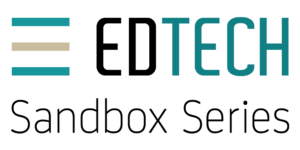
Workshop participants will explore how AI can support literature searching within literature reviews and examine ethical issues such as plagiarism, privacy, and research integrity. Participants will gain a foundational understanding of key AI-powered literature searching tools and learn how to evaluate their outputs for accuracy, relevance, and bias through hands-on activities.
By the end of this workshop, participants will be able to:
- Use AI tools effectively for literature searching
- Identify appropriate use cases for AI tools across the literature review process
- Critically evaluate AI-generated outputs for accuracy, relevance, and potential biases
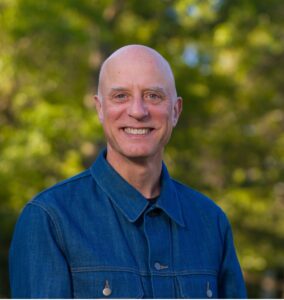
- Recognize ethical considerations and limitations of using AI for literature reviews
Register Now!
This session will be recorded, archived, and shared after the event.
About the Facilitator
Justin Harrison is a PhD candidate in the Faculty of Education at the University of Victoria focusing on media literacy, news literacy, and their intersections with civic engagement and political polarization. He has over twenty years professional experience as an academic research librarian focusing on information literacy, and currently holds the position of Engagement & Learning Librarian at the University of Victoria Libraries.
About the Series
Discover the BCcampus EdTech Sandbox Series!
In these 90-minute workshops, expert leaders will introduce and demonstrate cutting-edge, open, and free, or low-cost educational technology tools aligned with the B.C. Post-Secondary Digital Literacy Framework. Participants will experiment with tools, work with fellow educators to review features of the tools, gain insights into teaching activities, and discover ways to integrate these tools into courses.
Focus Areas for 2025-2026
- The AI Sandbox: a space dedicated to experimenting with, and reviewing, artificial intelligence tools and applications in educational settings.
- Other Learning Technologies: a space to explore, experiment, and review emerging learning technologies beyond AI, highlighting their potential impacts and practical applications.
EdTech Sandbox Series Sessions
-
- September 10, 2025 – Choose Your Own Adventure! Dynamic Branching Scenarios and Game Maps With H5P and AI Tools
- October 8, 2025 – The Intelligent Notebook: Become a Knowledge Expert With NotebookLM
- October 17, 2025 – [Special EdTech Sandbox] Remote Proctoring Through an Ethical Lens: the Case Against Surveillance
- November 26, 2025 – Claude vs. ChatGPT: Choosing the Right AI for the Job
- January 21, 2025 – Build Your Own Teaching Bot: My Story of Creating CITE GPT as a Teaching Tool
- March 3, 2026 – Literature Searching with Artificial Intelligence

The British Columbia Open Education Community (BCOEC) welcomes members from the post-secondary sector in British Columbia and the Yukon. This community convenes monthly in virtual gatherings, fostering an environment for sharing insights, providing support, and engaging in discussions about the challenges, best practices, and current issues within open education.
Register now!
Recordings and transcripts available from past meetings: B.C. Open Education Community (Playlist)

The British Columbia Open Education Community (BCOEC) welcomes members from the post-secondary sector in British Columbia and the Yukon. This community convenes monthly in virtual gatherings, fostering an environment for sharing insights, providing support, and engaging in discussions about the challenges, best practices, and current issues within open education.
Register now!
Recordings and transcripts available from past meetings: B.C. Open Education Community (Playlist)
About the Session
Are you interested in open pedagogy and teaching practices supporting social justice? Join this webinar to learn from a study examining faculty experience using open pedagogy to support social justice in their online classes.
While open pedagogy is often assumed to support social justice, this is not always the case. This webinar will provide insights on how faculty members at a B.C. post-secondary institution conceptualize social justice and how they put it into practice. Participants will also learn about a social justice-informed model of open pedagogy.
Register Now!
This session will be recorded, archived, and shared.
About the Facilitator
Melissa Ashman is an instructor of applied communications, public relations, and entrepreneurial leadership at Kwantlen Polytechnic University. An advocate for all things open, she has adapted and created open textbooks, developed and used open pedagogy assignments and practices, and completed research on open education. In 2025, she completed her doctor of education in distance education from Athabasca University. Her dissertation examined the intersection of open pedagogy, social justice, and online classes.

The British Columbia Open Education Community (BCOEC) welcomes members from the post-secondary sector in British Columbia and the Yukon. This community convenes monthly in virtual gatherings, fostering an environment for sharing insights, providing support, and engaging in discussions about the challenges, best practices, and current issues within open education.
Register now!
Recordings and transcripts available from past meetings: B.C. Open Education Community (Playlist)

The British Columbia Open Education Community (BCOEC) welcomes members from the post-secondary sector in British Columbia and the Yukon. This community convenes monthly in virtual gatherings, fostering an environment for sharing insights, providing support, and engaging in discussions about the challenges, best practices, and current issues within open education. This meeting will not be recorded.
Register now!
Recordings and transcripts from past meetings (June 2024 to June 2025): B.C. Open Education Community (Playlist)


